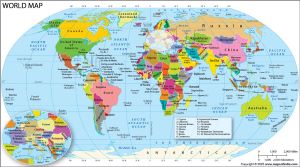Why do countries change their names? And what is in a name that makes people want to change from or to bearing a name. This has been an age long debate. Even the great literature master, William Shakespeare, wrote, “That which is called Rose by any other name will smell as good”.
But cases abound of individuals who have in the course of living, have changed their names. And even, nations, states, villages, hamlets and countries have been recorded to change names.
These modifications frequently seek to reshape national narratives, assert autonomy, or update global perceptions.
In that light, here is a rundown of seven countries around the world that have recently altered their names. And also, the circumstances surrounding them.
Turkey to Turkiye
On June 2, 2022, the United Nations declared that Türkiye would be the official reference for the country previously known as Turkey.
The decision was widely interpreted as Ankara’s strategic effort to rebrand the country and distance it from the avian namesake and any perceived negative connotations attached to it.
In a memo about the name change in 2021, Turkish President Recep Tayyip Erdogan said, “Türkiye is the best representation and expression of the Turkish people’s culture, civilization, and values.”
Holland to the Netherlands
In 2020, the Dutch Government opted to abandon the use of “Holland” in favor of its official name, “the Netherlands,” This was a part of a broader effort to modernize its global image.
The name change is said to be a strategic move to distance the country from its associations with recreational drug use and legal prostitution. These are factors that have drawn international attention to Amsterdam, located in the province of North Holland.
The Republic of Macedonia to North Macedonia
In 2019, the Republic of Macedonia, previously recognized as the former Yugoslav Republic of Macedonia, officially changed its name to the Republic of North Macedonia. Unlike some other country name changes driven by cultural or historical factors, this transformation was primarily motivated by political considerations.
Following its declaration of independence from Yugoslavia in 1991, the country chose to adopt the name Macedonia. However, this decision strained relations significantly with neighboring Greece, which also has a region known as Macedonia.
Swaziland to Eswatini
In April 2018, King Mswati III of Swaziland announced during celebrations for the 50th anniversary of Swazi independence that he was renaming the country “the Kingdom of eSwatini”.
The unexpected change to the name eSwatini, meaning “land of the Swazis,” was officially adopted by King Mswati, who had been referring to Swaziland as eSwatini for many years prior.
The King announced that the country was frequently mistaken for the European nation of Switzerland. “Whenever we go abroad, people refer to us as Switzerland,” he said.
Czech Republic to Czechia
Czechia’s decision to adopt the name was driven not by political or cultural considerations, but by marketing motives.
In 2016, the Czech government officially adopted the name Czechia. And recommended its use to promote a shorter version in international contexts.
The decision to propose the new name Czechia stemmed from concerns that “Czech Republic” was often perceived as too long and cumbersome. Thus, causing confusion and misunderstandings. Czechia was seen as a more user-friendly and modern alternative.
Cape Verde to Cabo Verde
In 2013, Cape Verde formally transitioned to Cabo Verde, a move advocated by Mario Lucio de Sousa, Minister of Culture. He highlighted the logistical challenges of frequent translations in diplomatic communications and tourism materials.
Intending to achieve a cohesive global identity, Cabo Verde officially requested the adoption of its new name in all United Nations languages. This was in exception for the longer form, Republica de Cabo Verde.
Cabo Verde aims to establish its identity through unique offerings, such as organic wines cultivated from volcanic soils.
Ceylon to Sri Lanka
In 1972, the island nation of Ceylon rebranded itself as Sri Lanka. It drew the new name from the Sinhalese language, and declared itself a republic.
This change aimed to better represent the country’s multicultural identity. As well as distance itself from its colonial history under British rule.
Although Sri Lanka officially changed its name from Ceylon upon gaining independence from British rule in 1972, it wasn’t until 2011 that the country formally removed the colonial name Ceylon from government use.
source: Vanguard
Follow us for more news on our WhatsApp News Channels @
https://whatsapp.com/channel/0029VaC505jB4hdZ5Yx9g82U
![]()

